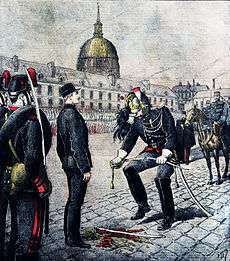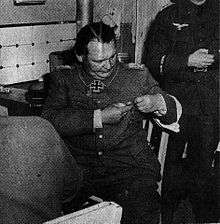Reduction in rank


Reduction in rank may refer to three separate concepts:
- In military law, a reduction in rank or degradation[1] is a demotion in military rank as punishment for a crime or wrongdoing, imposed by a court-martial or other authority. It may be imposed in conjunction with other punishments, such as a bad conduct or dishonorable discharge, loss of wages, confinement to barracks, or imprisonment in a military prison.
- Reduction in rank may also refer to the voluntary, non-punitive practice of taking a lower rank, often as part of joining another military unit or military service. For example, those who join the Special Air Service or Australian Special Air Service Regiment take the rank of trooper, often a lower rank than their previous rank but with greater pay, prestige, and responsibilities.
- There is a reversion in rank after an officer has been temporarily promoted to a higher rank while occupying a position requiring that rank; the officer reverts to the permanent rank on vacating the position bearing the higher rank. In the US military this occurs most often to three- or four-star general or flag officers, who can be reduced in rank to no lower than their permanent rank of two stars. This occurs because three- and four-star ranks are always temporary ranks and are linked to their position's office. A three- or four-star officer could revert non-punitively to a lower rank because they no longer hold a position bearing the higher rank. Reversion of this type is less usual for lower US ranks as such temporary promotions are uncommon.
History
Reduction in rank (Latin gradus deiectio meaning position degradation) was a Roman military punishment.
United States
The Uniform Code of Military Justice Subchapter III, non-judicial punishment, § 815. Article 15, commanding officer's non-judicial punishment, authorizes commanding officers to "in addition to or in lieu of admonition or reprimand" impose "reduction to the next inferior pay grade, if the grade from which demoted is within the promotion authority of the officer imposing the reduction or any officer subordinate to the one who imposes the reduction." Additionally, an officer of the grade of major, lieutenant commander, or above is authorized to impose "reduction to the lowest or any intermediate pay grade, if the grade from which demoted is within the promotion authority of the officer imposing the reduction or any officer subordinate to the one who imposes the reduction, but an enlisted member in a pay grade above E-4 may not be reduced more than two pay grades."
Uniform Code of Military Justice Subchapter VIII, Sentences, provides that:
§ 858a. ART. 58a. SENTENCES: REDUCTION IN ENLISTED GRADE UPON APPROVAL
(a) Unless otherwise provided in regulations to be prescribed by the Secretary concerned, a court-martial sentence of an enlisted member in pay grade above E-1, as approved by the convening authority, that includes--
(1) a dishonorable or bad-conduct discharge;
(2) confinement; or
(3) hard labor without confinement;
reduces that member to pay grade E1, effective on the date of that approval.
(b) If the sentence of a member who is reduced in pay grade under subsection (a) is set aside or disapproved, or, as finally approved does not include any punishment named in subsection (a)(1), (2), or (3), the rights and privileges of which he was deprived because of that reduction shall be restored to him and he is entitled to the pay and allowances to which he would have been entitled for the period the reduction was in effect, had he not been so reduced.
Examples
- Major General Ralph O. Baker – demoted to Brigadier General after groping a female advisor.[2]
- Major General Michael Carey – demoted to Brigadier General for conduct unbecoming an officer.[3]
- Lieutenant General John R. Dallager – reverted to Major General for the 2003 United States Air Force Academy sexual assault scandal
- Vice Admiral Richard Dunleavy – reverted to Rear Admiral and forced into early retirement for his statements about the Tailhook scandal.
- Lieutenant General Joseph Fil – reverted to Major General for accepting undisclosed gifts.
- Major General Thomas J. Fiscus – demoted to Colonel after being found to have had numerous affairs with various women.
- Vice Admiral Tim Giardina – reverted to Rear Admiral in connection with illegal gambling activities.
- Major General Michael T. Harrison – demoted to Brigadier General for failing to investigate a sexual assault.[4]
- Brigadier General Richard S. Hassan – demoted to Colonel after being found to have sexually harassed female subordinates, engaged in unprofessional relationships and created a hostile work environment.
- Brigadier General Janis Karpinski – demoted to Colonel for her role in the Abu Ghraib torture and prisoner abuse.
- Admiral Husband E. Kimmel – reverted to Rear Admiral for his role in the attack on Pearl Harbor.
- Major General Samuel W. Koster – demoted to Brigadier General for the My Lai Massacre.
- General John D. Lavelle – reverted to Major General for alleged misconduct over bombing missions during the Vietnam War.
- Admiral Richard C. Macke – reverted to Rear Admiral and forced into early retirement for his statements about the 1995 Okinawan rape incident.
- Major General John J. Maher III – demoted to Colonel for having affairs with his subordinates' wives.[5]
- 10th Sergeant Major of the Army Gene McKinney – demoted to Master Sergeant after being convicted of obstruction of justice
- Major General Henry J. F. Miller – demoted to Colonel as a result of a security breach.
- Major General Arthur B. Morrill III – demoted to Brigadier General for dating another woman whilst legally separated from his wife.[6]
- Colonel Michael D. Murphy – demoted to First Lieutenant after being charged with absence without leave; failure to obey order/dereliction of duty; false official statement; larceny; and conduct unbecoming an officer and a gentleman in violation of the Uniform Code of Military Justice (UCMJ) Articles 86, 92, 107, 121, and 133, respectively.
- Brigadier General Robert Newell – demoted to Colonel after being found to have had sexual relations with a female subordinate.
- Rear Admiral David Pimpo - Reverted to Captain in connection with bribery.
- Vice Admiral John Poindexter – reverted to Rear Admiral in connection with the Iran–Contra Affair.
- Lieutenant General John M. Riggs – reverted to Major General because of misuse of contractors.
- Lieutenant General Walter Short – reverted to Major General for his role in the attack on Pearl Harbor.
- Brigadier general Jeffrey Allen Sinclair – demoted to Lieutenant Colonel after being found to have had adulterous affairs and committed sexual assaults.[7]
- Vice Admiral John Dickson Stufflebeem – reverted to Rear Admiral for lying about having an affair.[8]
- Vice Admiral Ralph L. Tindal – reverted to Rear Admiral in connection with having an affair.[9]
- General William E. Ward – reverted to Major General while awaiting the completion of investigation in connection to improper usage of funds, then retired at the rank of Lieutenant General.
References
- ↑ "degrade". Oxford English Dictionary (3rd ed.). Oxford University Press. September 2005. (Subscription or UK public library membership required.)
- ↑ http://www.stripes.com/news/army-general-accused-of-sex-assault-by-adviser-quietly-retired-with-demotion-1.306106
- ↑ http://www.militarytimes.com/article/20140410/NEWS/304100051/Former-20th-Air-Force-commander-fired-after-Russia-trip-will-retire-1-star
- ↑ http://www.cbsnews.com/news/u-s-army-general-demoted-for-mishandling-sexual-assault-report/
- ↑ http://www.nytimes.com/1999/11/17/us/general-is-demoted-2-ranks-and-made-to-retire-in-sex-case.html
- ↑ http://www.airforcetimes.com/news/2010/03/airforce_morrill_032010w/
- ↑ http://www.foxnews.com/us/2014/06/20/army-general-demoted-two-grades-in-sexual-misconduct-case/
- ↑ http://articles.cnn.com/2008-05-09/us/admiral.affair_1_john-stufflebeem-federal-agency-affair?_s=PM:US
- ↑ http://www.apnewsarchive.com/1995/Navy-Admiral-Retires-After-Being-Found-Guilty-of-Sexual-Harassment/id-b189b2096e656824db98a08e21797273
External links
| Wikimedia Commons has media related to Cashiering. |